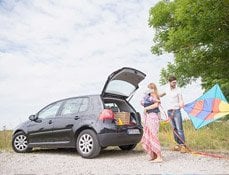iSelect does not compare all providers or policies in the market and not all policies or special offers are available at all times, through all channels or in all areas. Not all policies available from our providers are compared by iSelect and due to commercial arrangements and customer circumstances, not all policies compared by iSelect are available to all customers. Learn more.
What is car insurance?
Comprehensive car insurance can provide peace of mind, helping cover the cost of damage that may happen to your car due to theft or collision. Depending on your policy, car insurance can cover all or part of the cost of repairs or replacement, as well as the cost of damages to a third party’s car or property.
What does car insurance cover?
Third party property helps cover damage to other people’s car or property. Third party fire & theft provides additional cover to help cover your car if it’s damaged by fire or stolen. Comprehensive cover provides third party cover, as well as helping cover your vehicle if it’s damaged in an accident.
Car insurance, simplified
Easily compare, select and save on car insurance policies
What types of car insurance are available in Australia?
Comprehensive
This provides an extensive level of coverage. It can help cover the cost of repairs to your vehicle in the event of accidental or malicious damage, theft, fire, hail, and third party damage (regardless of fault).
Third Party Property
This typically covers you for damage you cause to other people’s property, such as their car or property in a car accident. Unlike comprehensive, it typically doesn’t cover damage to your car.
Third Party Fire & Theft
This typically covers damage to other people’s property and can provide limited cover for damage to your car as a result of theft or fire. It typically does not cover you for other damage caused to your car.
Compulsory Third Party (CTP) or Greenslip
As its name suggests, CTP is a minimum compulsory insurance required to drive on Aussie roads. Depending on which state you live in, it could be included in the cost of your vehicle registration, or you may have to purchase it separately from an insurer. CTP helps cover the cost of compensation claims if you injure or kill someone in a car accident.
Helpful Tip:
You may want to start researching your car insurance before you buy the car. It could sway towards one make or model over another. Besides, it’s best to know what you’ll be expected to pay before signing up for a shiny new set of wheels. It also pays to be honest with your insurer about your circumstances to avoid disputes if you lodge a claim.
How you can compare car insurance quotes with iSelect
Average car insurance premiums in Australia
Use our interactive chart to find out the average car insurance premiums from around Australia to see how yours compare.
Learn more about the optional extras offered by some of our providers
Freedom to nominate your choice of repairer
Got a preferred car repairer you’ve always worked with? This optional extra gives you the ability to nominate your preferred repairer. By not selecting this option, the repairer could be solely at your insurer’s discretion.
Hire car services if your car is written off
If your car is essential for your work commute or general lifestyle, this optional extra may be of benefit to you. With this extra, your insurer may provide you with a replacement hire car for a set period of time, if your car is written off. This may come with an additional fee.
Reduce your window glass excess
You could be driving along the highway, and a vehicle on the road ahead flicks up a stone that cracks or chips your windscreen. Typically, an insurer will charge you an excess to repair this damage, which could total hundreds of dollars. With this optional extra, you can choose to pay more on your policy premiums, and reduce the amount of excess you’d have to pay in the event that your windscreen needs repair or replacement.
Roadside assistance
With roadside assistance you’ll never have to fear being stranded if your car breaks down. Optional roadside assistance bundled with comprehensive cover from iSelect’s car insurance providers could include: battery assistance, tyre changes, towing, key rescue, emergency fuel, and more, depending on the provider and policy.
You might be interested in…

These are the common types of car insurance policies: Comprehensive cover, Third Party Fire & Theft cover, Third party property…
Read More
Cars cost money – there’s no way around it, but there are ways to minimise insurance costs. Read on to understand factors t…
Read More
Young and new drivers will often face stiff premiums when they take out car insurance for the first time. And if you look at th…
Read More
Australian Comprehensive Car Insurance Explained at one point we’ve all thought, “That won’t happen to me,” but the tru…
Read More
In Australia, all registered cars must have Compulsory Third Party (CTP) insurance. But do you need more cover than that?
Read MoreYour car insurance questions, answered
What is comprehensive car insurance?
Comprehensive car insurance offers peace of mind to vehicle owners. Also known as full or complete cover, it means you can be covered for a range of circumstances, including:
- Repair or payment of the insured value of your vehicle for events including theft, collision, fire, malicious damage and weather-related damage
- Repair or payment of the value of other vehicles that are damaged by your vehicle in an accident, and damage to property up to the policy limits
Some companies offer a variety of optional extras as well, ranging from windscreen protection, to use of hire cars. That said, it’s important to always read the Product Disclosure Statement (PDS) of your policy to get a better understanding of policy inclusions, limitations and exclusions.
What is third party insurance?
Third party insurance is the minimum car insurance product which most car insurers offer. There are three types available, which are:
- Compulsory third party (CTP): Covers death and injury to people if you’re involved in an accident. Each state and territory has different rules regarding this cover, so it’s important you check with your local transport authority for further information
- Third party property: Covers repair costs for property damage caused by your car up to the limits of the policy
- Third party property, fire, and theft: Covers damage to other people’s property and provides cover for theft of your vehicle, or damage to your vehicle caused by fire up to the limits of the policy
Ensure you review the Product Disclosure Statement for policy inclusions, limitations and exclusions.
Why is car insurance often more expensive for younger drivers?
What does market value and agreed value mean?
When you sign up for car insurance, you’re often asked whether you want to insure your car for an agreed value or for market value. This is the monetary figure you’ll receive from your insurer should your car be written-off. Market value takes into consideration depreciation and wear and tear, making it an accurate representation of the amount you would have received if you’d sold your car. Agreed value is an amount you and the insurer have agreed upon at the start of your policy for the period of insurance. In most cases, the figure may still reduce to account for depreciation at time of renewal. Ensure you review the Product Disclosure Statement for policy inclusions, limitations and exclusions.
How can I reduce my car insurance premium?
While insurers calculate premiums differently, there are a number of things you can do which may reduce the cost of your car insurance premiums. These include but are not limited to:
- Parking your car in secure parking (such as in a lock-up garage) if possible, to reduce the risk of theft, vandalism, flood or storm damage claims
- Buying a car fitted with an immobiliser or a security alarm or having them installed. Along with other technology such as a GPS tracking device it may reduce the risk of theft and damage claims
- Driving less often. For example, catching public transport to work. Some insurers may offer lower premiums for drivers who don’t use their car frequently
- Limiting the number of drivers nominated on your policy, especially if they’re under 25. Fewer drivers means less risk of a claim for your insurer
- Choosing a higher excess, which means you’re taking on a larger part of the risk from your insurer
- Choosing to insure for market value or a lower agreed value, which will reduce the amount your insurer has to pay-out should your car be written-off
What is a no claims discount?
If you’ve been insured by your provider for an extended period of time and haven’t made any claims during that period, you may be eligible for a no-claims discount. This discount is usually applied to your premium, partly as a reward for not making a claim and partly out of loyalty for you staying with your provider. Eligibility for the discount can vary depending on your insurance provider and their criteria. When reviewing policies and providers, it might be worth finding out about their no-claims discount and discovering the length of time that has to pass in order for you to be eligible. In some cases, insurance providers may carry over your no-claims discount from another provider. In some cases, a provider may not offer a no-claims discount, and will instead offer a reduced premium based on other risk related information.
Ensure you review the Product Disclosure Statement for policy inclusions, limitations and exclusions.
Does car insurance cover unlisted drivers?
Whether your car insurance covers unlisted drivers ultimately depends upon your individual policy. It’s important you check with your provider to determine how an unlisted driver is taken into account for your policy. In some cases, it may increase the cost of your excess should they be driving when an accident occurs. In other cases, it could result in the refusal of a claim. Ensure you review your insurer’s Product Disclosure Statement for information about policy coverage, limitations and exclusions.
What is excess in car insurance?
Just like some other forms of insurance, such as travel or home and contents insurance, car insurance can have an excess payment. It’s the charge you pay after making a claim in order to receive the benefits that your policy entitles you to (such as repair or replacement of your vehicle). You usually only pay an excess charge if you’re at fault or are unable to identify another party at fault. By paying an excess, you’re taking on a small part of the financial risk (which helps to reduce your premiums). If you’re able to identify a third party who is at fault, your insurance provider will then go to the third party to recover the costs – or their insurance provider. Ensure you review the Product Disclosure Statement for policy inclusions, limitations and exclusions.
How do I make a claim on car insurance?
How you make a claim depends upon your insurance provider and the options they’ve made available to you. Some providers allow you to start the claims process online or via their app, while others require you to contact them over the phone. Important details that your provider may request (if feasible) when making a claim can include but may not be limited to:
- The details of any other party or parties involved, including name, phone number, vehicle registration, address, license number and insurance details
- The names and phone numbers of any witnesses
- Photos of the accident scene and damage to the vehicles involved, if possible
- Any reports from police or paramedics, if they were required
Which car insurance is the best?
Can a family member drive my car under my insurance policy?
Typically, not without asking your insurer first.
If a family member drives your car and becomes involved in an accident, and they aren’t listed on your policy as a driver, you could face a higher excess fee if they’re at fault or they may not be covered at all.
Some policies also have age restrictions, typically regarding drivers under the age of 25. So, if your policy has an age restriction and your child or family member who is under 25 years old, drives your car, and is involved in an accident, they won’t be covered. If your policy doesn’t have an age restriction, then they may be covered, but you should watch out for any additional age-related excesses which may be applied.
Can I drive a family member’s car?
If you haven’t been listed on the insurance policy as a driver and have an accident, then whoever owns the car will most likely face a higher excess fee on top of their usual excess fee or the car may not be covered at all.
With that in mind, it’s important to remember that every registered car is required to have a basic level of cover, which is known as Compulsory Third Party (CTP) insurance (also known as green slip insurance in New South Wales). So, if you drive a family member’s car and you’re involved in an accident that results in any injury (even death) of a third party, then you would be covered for the related injuries. With that in mind, make sure you are always taking care and driving safely on the roads.
As always, ask the insurer about any limits or exclusions on the policy to avoid any confusion.
Are maintenance costs included in car insurance?
No, insurers don’t typically provide cover for mechanical costs and maintenance costs. Regular servicing is recommended for any motor vehicle.
If you notice signs of wear and tear or rust and rot on your car, it might mean it’s time for some TLC or paying a qualified repairer or mechanic to keep your car in great condition.
What do I do if my car is stolen?
Firstly, contact the police and provide details of the theft. They will require some personal details as well. Once that’s done, the police will do what they can to locate your car.
Then you can contact your insurer to make a claim. Both Third Party Fire & Theft and Comprehensive car insurance should cover you if your car is stolen.
If your car is stolen and isn’t located and recovered, then your insurer can replace your car or pay you the amount for which the car is insured – minus any excess you owe.
What happens if someone breaks into my car but doesn’t steal it?
If someone tries to steal your car and fails, then your claim may depend on the type of policy you have. For example, if you have Third Party Fire & Theft cover, then any damage to the car might not actually be covered if the thief doesn’t successfully steal it.
Although if you have a Comprehensive policy, then any damage is typically covered, no matter whether or not the vehicle is stolen.
How long does it take for my claim to go through if my car is stolen?
Will inflation affect my car insurance premiums?
If cost of living increases, then it’s possible that your car insurance premiums may increase, but this also depends on your insurer and your particular situation.
There are dozens of factors that determine insurance premiums and inflation is only one of them.
Will my premiums increase if I make a claim?
Whether you’re at-fault, or even if you aren’t, it’s possible that premiums could increase. In these situations, you might consider comparing options with iSelect to see if you can find a more competitive policy.*
What should I do if my car insurance premiums continue to increase even if I stay with the same insurer for years?
It would be nice to see our loyalty rewarded and have our premiums decrease as the years go by, but there are lots of factors that come into play, especially in a period of inflation where the cost of living continues to rise for the broader population.
Insurers typically adjust premiums to reflect the likelihood of policyholders making a claim. For example, if you live in an area that’s received many claims at once due to a natural disaster such as a flood, or it’s considered a high-risk zone, then you could be classified as a bigger risk to your insurer and therefore be required to pay a higher premium.
If you’ve recently been involved in an accident, then this could affect your premiums too.
Comparing the differences between policy features, benefits and limitations is key to improving your knowledge of the insurance market. If you regularly compare policies, then you can increase the likelihood of finding a policy that better suits your budget and needs.
Mark Pangrazio
Executive – Commercial, iSelect
Mark is the Executive – Commercial at iSelect. Mark also loves a chat. Ask anyone in the iSelect team and they’ll tell you how you can always stop for a yarn with Mark – whether it’s about work, footy, what you’re up to or the weather. Mark’s also passionate about helping people by arming them with knowledge about the different types of car insurance available through iSelect, so they can better their options from our range of policies and providers.
Looking for Car Insurance? Here are Mark’s top tips
- Regularly review your policy, not just at renewal time. Providers can make changes to their policies at any time of the year. This can happen due to things like fluctuations in the insurance market and the number of claims in your area. If you regularly review your policy, you can put yourself in a position to get a better rate that suits your budget and needs.
- Check your odometer. Get an understanding of how many kilometres you drive each year. If you’re not driving as much then you could find a policy with a more cost-effective rate and save some cash.
- Find out about limits to policy benefits. Comprehensive car insurance policies often have limits to some of their benefits. For example, the insurer might only pay so much for things like emergency transport or replacement keys. You can compare these limits on different policies and consider which one might suit your needs.
- Review the price per payment period. Many providers offer a range of payment options, so you can choose whether you’d like to pay annually, monthly, or even fortnightly. If it’s within your means to do so, you might like to pay annually as this could be cheaper than paying month-to-month.
iSelect does not compare all car insurers or policies in the market. The availability of policies may change from time to time. Not all policies available from iSelect’s providers are compared by iSelect and due to commercial arrangements, area or availability, not all policies compared by iSelect will be available to all customers. Some policies are available only from iSelect’s call centre or website. A number of our participating general insurance brands are arranged by Auto & General Services Pty Ltd ACN 003 617 909 on behalf of Auto & General Insurance Company Limited 111 586 353, both of which are related entities of iSelect Limited. Our relationship with those companies does not impact the integrity of our comparison service. Click here to view iSelect’s range of providers.
iSelect General Pty Limited ABN 90 131 798 126, AFS Licence Number: 334115. Any advice provided by iSelect is of a general nature and does not take into account your objectives, financial situation or needs. You need to consider the appropriateness of any information or general advice iSelect gives you, having regard to your personal situation, before acting on iSelect’s advice or purchasing any policy. You should consider iSelect’s Financial Services Guide which provides information about our services and your rights as a client of iSelect. iSelect receives commission for each policy sold that is a percentage of the premium or a flat fee. Ask us for more details before we provide you with any services.
*Based on iSelect data using Adobe Analytics Tracking Tool

.svg)










